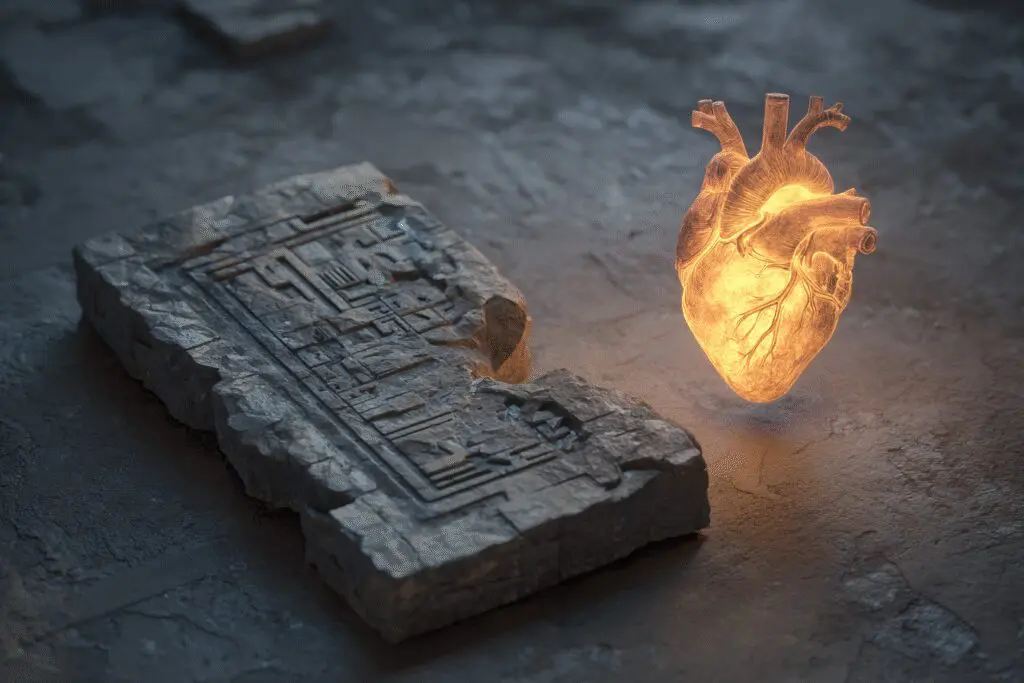Have you ever made a promise you couldn’t keep? I know I have. It’s a sinking feeling, isn’t it? We have the best intentions, but life happens, and we fall short. This human experience of falling short is actually at the very heart of understanding one of the most incredible promises ever made. So, what is the New Covenant in the Bible?
In its simplest form, it’s God’s unbreakable promise, sealed by Jesus, that offers a completely new way to have a relationship with Him—one based not on our ability to follow rules, but on His grace and forgiveness.
It’s a shift from an external set of laws written on stone to an internal transformation written on our very hearts. This wasn’t just a minor update; it was a game-changing new agreement for all of humanity.
More in Bible Category
What Is Temptation in the Bible
What Is Covetousness in the Bible
Key Takeaways
- The New Covenant is God’s promise of a new relationship with humanity, established through Jesus Christ.
- It replaces the Old Covenant (Mosaic Law), which humans were unable to perfectly keep.
- Instead of laws on stone tablets, the New Covenant involves God’s laws being written on our hearts by the Holy Spirit.
- The core benefits are the complete forgiveness of sins and a direct, personal relationship with God.
- This covenant is entered into by faith in Jesus, not by works or rule-following.
Why Did We Even Need a New Covenant?
To really grasp how revolutionary the New Covenant is, we first have to understand what it replaced. Why was a new agreement necessary? It all goes back to the first major covenant God made with the nation of Israel.
What Was the Old Covenant All About?
Think of the Old Covenant, often called the Mosaic Covenant, as a detailed agreement God made with His people, Israel, at Mount Sinai. Moses was the mediator, and the terms were laid out in the Law, which includes the famous Ten Commandments and hundreds of other rules governing worship, society, and daily life.
The purpose of this law was never just about rules for the sake of rules. It served a few critical functions:
- It Revealed God’s Holy Nature: The Law showed people what a holy and perfect God is like. It set a standard for righteousness.
- It Set Israel Apart: These laws were meant to make Israel a unique nation, a “kingdom of priests” that would represent God to the world.
- It Revealed Sin: This is the big one. The Law acted like a perfect mirror. It showed people their sin. You might not have known coveting was wrong until the law said, “You shall not covet” (Romans 7:7). The Law diagnosed the problem perfectly, but it couldn’t provide the cure.
So, What Was the Problem with the Old Covenant?
If the Law was good and holy, what was the issue? The problem was never with the Law itself. The problem, as it so often is, was with us. People were simply unable to keep it perfectly. Imagine being given a perfect, flawless blueprint to build a house, but having faulty tools and unsteady hands. The blueprint isn’t the problem; the builder’s inability is.
The book of Hebrews in the Bible puts it this way: “For if there had been nothing wrong with that first covenant, no place would have been sought for another” (Hebrews 8:7). It goes on to say God found fault with the people. The Old Covenant constantly pointed out their failures through endless sacrifices that had to be repeated year after year. It was a constant reminder of their sin, a cycle of trying, failing, and atoning, over and over again. God knew a better way was needed. A permanent solution.
What Exactly Did Jesus Promise with the New Covenant?
Centuries before Jesus was even born, God started hinting at this new plan. Through the prophet Jeremiah, He made an incredible promise:
“‘The days are coming,’ declares the Lord, ‘when I will make a new covenant… It will not be like the covenant I made with their ancestors… I will put my law in their minds and write it on their hearts. I will be their God, and they will be my people… For I will forgive their wickedness and will remember their sins no more.’” (Jeremiah 31:31-34).
This is the promise Jesus came to fulfill. It’s a promise of a radical, inside-out transformation.
How is the New Covenant Different?
The differences between the Old and New Covenants are not just small tweaks; they are fundamental. Think of it as the difference between getting a long list of rules for a relationship versus actually falling in love. One is external and obligation-based, while the other is internal and desire-based.
Here’s a simple breakdown of the massive upgrade:
- External vs. Internal: The Old Covenant law was written on stone tablets, external and separate from the people. The New Covenant is internal, with God’s desires becoming our desires, written on our hearts by His Spirit.
- Mediator: The Old Covenant was mediated by Moses, a man. The New Covenant is mediated by Jesus Christ, the Son of God himself, who is the perfect go-between.
- Sacrifice: The Old required a constant stream of animal sacrifices to temporarily cover sin. The New is based on the one-time, perfect sacrifice of Jesus on the cross that completely removes our sin for all time.
- Access to God: Under the Old Covenant, only the High Priest could enter the most holy place in the temple, and only once a year. Because of Jesus’ sacrifice, under the New Covenant, everyone who believes has direct access to God anytime. The veil was torn!
Where Does Jesus Talk About This New Covenant?
The most powerful and personal inauguration of this New Covenant happened during a very solemn moment: the Last Supper. On the night before He was crucified, Jesus sat with His closest friends, and He took the symbols of that meal—the bread and the wine—and gave them a profound new meaning.
As He passed the cup of wine, He said, “This cup is the new covenant in my blood, which is poured out for you” (Luke 22:20).
Think about that for a moment. All ancient covenants were sealed, or ratified, with a blood sacrifice. Jesus was declaring that His own death, His own blood, would be the sacrifice that sealed this brand-new, everlasting promise between God and humanity. He was the lamb, His sacrifice was the seal, and the promise was one of forgiveness and a new life.
How Does the New Covenant Change How We Live Today?
This isn’t just some abstract theological concept from thousands of years ago. The reality of the New Covenant radically changes everything about how we can approach God and live our daily lives. It’s the difference between trying to earn a relationship and freely receiving one as a gift.
Does This Mean the Old Testament Law Doesn’t Matter Anymore?
This is a question that comes up a lot. If we are under a New Covenant, can we just throw out the entire Old Testament? Not at all. Jesus himself said he didn’t come to abolish the Law, but to fulfill it (Matthew 5:17).
Think of it like this: The Old Law was the scaffolding around a building under construction. It was absolutely necessary for the construction phase, showing the shape and structure of God’s holy standard. But once Jesus, the building itself, was complete, the scaffolding was no longer the main point. He perfectly fulfilled every requirement of the law on our behalf.
We still look to the Old Testament to learn about God’s character and His unchanging moral principles. We see the wisdom in its teachings. However, we are no longer under its system of rules and sacrifices to make ourselves right with God. We are made right with God through Jesus alone.
What Does It Mean to Have the Law Written on Our Hearts?
This is perhaps the most beautiful part of the New Covenant promise. It’s not just that we are forgiven; it’s that we are changed from the inside out. Having the law written on our hearts means God gives us a new “wanter.” Through the Holy Spirit, who comes to live inside every believer, we actually begin to desire the things God desires.
It’s not about gritting our teeth and forcing ourselves to “do the right thing” out of fear of punishment. Instead, it becomes a joyful response of a heart that has been changed by love and gratitude. We obey not because we have to in order to be saved, but because we want to, because we love the One who saved us. It’s a motivation of love, not a motivation of legalistic fear. It’s a profound shift that you can learn more about through resources from established theological institutions like Dallas Theological Seminary, which explore these concepts in depth.
How Can I Be Sure My Sins Are Forgiven Under the New Covenant?
Our assurance of forgiveness doesn’t come from our own performance. If it did, we’d be right back in the same boat as those under the Old Covenant—constantly worried if we’ve done enough.
Instead, our assurance rests entirely on the finished work of Jesus Christ. The New Covenant promise is that God will “remember their sins no more” (Hebrews 10:17). When God looks at a person who has put their faith in Jesus, He doesn’t see their record of failures. He sees the perfect record of His Son.
Our forgiveness is based on His grace—a completely free and unearned gift. All we have to do is receive it. This is the source of our peace and our confidence. It’s not about how good we are; it’s about how good He is.
What is Our Role in the New Covenant?
If the New Covenant is a free gift based entirely on what Jesus did for us, what part do we play? Is there anything we need to do? This is a crucial question.
Is It All Just a Free Pass?
Some people hear about this amazing grace and wonder if it’s just a “get out of jail free” card—a license to do whatever we want because we know we’ll be forgiven. The Bible is very clear on this: absolutely not.
Our role in the New Covenant is not one of work, but of faith. We are called to believe the promise and receive the gift. Faith is simply trusting in what Jesus has already done for us, rather than trusting in our own efforts to make ourselves right with God.
But true, genuine faith is never a dead, inactive thing. It always produces a changed life. The good works we do are not the root of our salvation; they are the fruit of our salvation. We serve, love, and obey God not to get into the covenant, but because we are already in it, and our hearts are overflowing with gratitude for such an incredible gift.
How Do I Enter Into This New Covenant?
Entering the New Covenant isn’t a complicated ritual. There isn’t a ten-step program or a list of rules to check off. It is a deeply personal decision to stop trusting in yourself and to put your full trust in Jesus.
It’s about acknowledging that, like everyone under the Old Covenant, you can’t be perfect on your own. It’s about believing that Jesus’s sacrifice on the cross was enough to pay for all of your shortcomings—past, present, and future.
It’s a simple, humble prayer from the heart, telling God you believe in His promise and you accept the gift of new life offered through His Son. That act of faith is the doorway into the New Covenant.
In the end, the New Covenant is the most hopeful message in the entire Bible. It’s a story of God knowing we couldn’t reach Him, so He made a new and better way to reach us. It’s a promise of not just forgiveness for our past, but of a transformed heart for our future. It is the ultimate promise from Jesus, sealed with His love, and offered freely to everyone.
Frequently Asked Questions – What Is the New Covenant in the Bible

How can one enter into the new covenant?
To enter into the new covenant, a person must recognize their need for God’s help due to sin, believe in Jesus Christ as the Son of God who died and rose again for their sins, and accept the gift of salvation through faith, turning away from sin and trusting completely in Jesus.
What are the benefits of the new covenant for believers today?
The benefits of the new covenant include receiving a new heart empowered by the Holy Spirit, direct access to God without barriers, full forgiveness of sins, and the assurance of eternal life. It transforms believers from within and offers a personal, trusting relationship with God.
How did Jesus establish the new covenant?
Jesus established the new covenant through His death on the cross, which He described during the Last Supper as His blood poured out for the new covenant. His sacrifice was one-time, perfect, and sufficient to pay for sin, sealing the covenant and providing believers with an ongoing, personal relationship with God.
Why was a new covenant needed instead of the old covenant?
A new covenant was needed because the old covenant, while holy and good, could not remove sin from the heart or provide lasting forgiveness. It was a shadow of better things to come and showed humanity’s guilt but couldn’t change the sinful nature. The new covenant, promised through prophets like Jeremiah, offers internal change and full forgiveness through Jesus.




